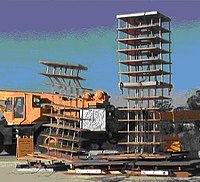
On estimation of seismic damage from ductility and hysteretic energy demands in equivalent oscillators using linear response
Sign Up to like & getrecommendations! Published in 2018 at "Engineering Structures"
DOI: 10.1016/j.engstruct.2018.04.096
Abstract: Abstract Estimation of damage in a structure under anticipated seismic events is important for its performance-based design. This can be done in terms of the ductility and hysteretic energy demands for each of the anticipated… read more here.
Keywords: ductility hysteretic; hysteretic energy; equivalent oscillators; damage ... See more keywords

Distribution of hysteretic energy demands in self-centering concrete frames with hybrid joints
Sign Up to like & getrecommendations! Published in 2021 at "Soil Dynamics and Earthquake Engineering"
DOI: 10.1016/j.soildyn.2021.106828
Abstract: Abstract To implement the energy-based seismic design, it is important to quantify the energy dissipation within a structure. This paper evaluates the hysteretic energy demand (EH) within self-centering concrete frames (SCCF) with hybrid joints. Twelve… read more here.
Keywords: self centering; hybrid joints; distribution; hysteretic energy ... See more keywords

Energy-Based Seismic Design Method for EBFs Based on Hysteretic Energy Spectra and Accumulated Ductility Ratio Spectra
Sign Up to like & getrecommendations! Published in 2019 at "Advances in Civil Engineering"
DOI: 10.1155/2019/3180596
Abstract: In the case of far field earthquakes, structural failure often results from accumulated damage caused by cyclic effects and gradual accumulation of energy. This paper proposes an energy-based seismic design method for steel eccentrically braced… read more here.
Keywords: energy; seismic design; method; hysteretic energy ... See more keywords

Mathematical Expression of Design Hysteretic Energy Spectra Based on Chinese Soil Type
Sign Up to like & getrecommendations! Published in 2019 at "Mathematical Problems in Engineering"
DOI: 10.1155/2019/3483516
Abstract: This paper explores the energy-based seismic design based on source-to-site distance and the site classification found in Chinese national codes. Specifically, 750 ground motion records were selected according to Chinese site classification, and the equivalent… read more here.
Keywords: energy; soil type; ratio; site ... See more keywords

The Hysteretic Energy as a Performance Measure in Analytical Studies
Sign Up to like & getrecommendations! Published in 2018 at "Earthquake Spectra"
DOI: 10.1193/112816eqs207m
Abstract: Hysteretic energy dissipation is often employed as a measure of performance for systems subjected to earthquake excitation. This mainly stems from quasi-static cyclic tests where fuller hysteresis loops (i.e., higher energy absorption) are taken to… read more here.
Keywords: energy; energy performance; measure; hysteretic energy ... See more keywords